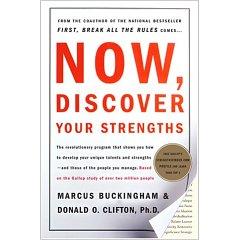 Now, Discover Your Strengths has been a fairly significant book for me lately. Our staff at The Chapel has gone through it, but our music staff in particular has spent a good deal of time with it, using it to get to know ourselves better and thereby (hopefully) getting to know eachother better. To truely capitalize on it, your discovered strengths have to be shared with others on the team, otherwise, it will be hard to maximize your collective strengths.
Now, Discover Your Strengths has been a fairly significant book for me lately. Our staff at The Chapel has gone through it, but our music staff in particular has spent a good deal of time with it, using it to get to know ourselves better and thereby (hopefully) getting to know eachother better. To truely capitalize on it, your discovered strengths have to be shared with others on the team, otherwise, it will be hard to maximize your collective strengths.The big idea of the book is that we all have been both born with strengths, and at a very young age have begun to develop them through a "forging pathways" of the brain. We "default" to these patterns. The strengths, by definition are always producing possitive results. Sometimes it's visionary, sometimes it's relational, sometimes it's steadfast beliefs. Whatever the case, we each have them. When we can combine our occupation with aspects of these strengths, we hit the "sweet spot," and things come naturally and easy to us.
Another big idea from this book is that we often spend too much time emphasizing our weaknesses. We emphasize them by trying to bring them up to the level of our strengths. This, the authors argue is a waste of our time and energy and do not serve to really energize us in whatever task we have before us. We shouldn't ignore the weaknesses, for sure, but they should not be our primary focus. For us, our endeavor should be to capitalize on what we know are our strengths.
So how do we "discover" our strengths? The authors of the book, in conjunction with Gallup surveys have interviewed over 2 million people and tabulated the data in order to see patterns emerge. With this data, you take a StrengthsFinder test and discover what yours are.
When you buy a book, on the inside flap is a code that you use at the StrengthsFinder's web site. You type in the code, take a 20-30 minute test and an instant analysis is determined to show you what your top five strengths are. My number one strength turned out to be Learner. Here's what the authors say about that characteristic:
You love to learn. The subject matter that interests you most will be determined by your other themes and experiences, but whatever the subject, you will always be drawn to the process of learning. The process, more than the content or the result, is especially exciting for you. You are energized by the steady and deliberate journey from ignorance to competence. The thrill of the first few facts, the early efforts to recite or practice what you have learned, the growing confidence of a skill mastered-this is the process that entices you. Your excitement leads you to engage in adult learning experiences-yoga or piano lessons or graduate classes. It enables you to thrive in dynamic work environments where you are asked to take on short project assignments and are expected to learn a lot about the new subject matter in a short period of time and then move on to the next one. This Learner theme does not necessarily mean that you seek to become the subject matter expert, or that you are striving for the respect that accompanies a professional or academic credential. The outcome of the learning is less significant than the "getting there."
More on my other strengths later. What's your top strength?
Brian
![]()
